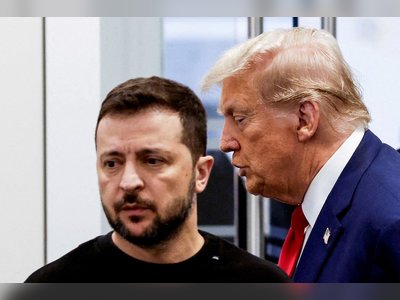White HouseSenateThe HouseSupreme CourtFederal ReserveDOJState DepartmentTreasuryCensusBudget OfficeTrade Representative
WashingTone
Informed by Washington, Defined by Insight
Tuesday, Apr 08, 2025
WashingTone
President Trump Calls on the Federal Reserve to Reduce Interest Rates in Light of New Tariffs
Federal Reserve Chair Jerome Powell warns against swift rate reductions, citing the potential inflation risks associated with the expansion of tariffs.
On April 4, 2025, U.S. President Donald Trump urged Federal Reserve Chair Jerome Powell to lower interest rates, citing decreasing energy costs, reduced inflation, and improving employment statistics.
In a post on his social media platform, Trump asserted that recent figures indicated a sixty-nine percent decrease in egg prices within two months and pressed Powell to "stop playing politics."
These comments were made in the context of increased volatility in global markets following the U.S. announcement of new tariffs on Chinese products.
In retaliation, China enacted a thirty-four percent tariff on all imports from the U.S.
On the same day at a press conference in Virginia, Chair Powell remarked that the Federal Reserve would await further insight before altering interest rates.
He indicated that the newly implemented tariffs were "significantly larger than expected" and would likely lead to increased inflation and slower economic growth.
Powell reiterated the Fed's commitment to keeping long-term inflation expectations stable and avoiding the danger of a prolonged rise in prices.
He acknowledged that while the U.S. economy seems robust, the complete impact of the tariffs is still uncertain, and the central bank would refrain from making hasty decisions.
In light of the tariff announcements and ongoing uncertainty, U.S. financial markets experienced notable declines.
The S&P 500 fell by 4.8 percent, the Dow Jones Industrial Average decreased by 4 percent, and the Nasdaq Composite dropped by 6 percent, marking its most significant daily decline since March 2020.
The Federal Reserve's current benchmark interest rate remains between 4.25 and 4.5 percent.
In a post on his social media platform, Trump asserted that recent figures indicated a sixty-nine percent decrease in egg prices within two months and pressed Powell to "stop playing politics."
These comments were made in the context of increased volatility in global markets following the U.S. announcement of new tariffs on Chinese products.
In retaliation, China enacted a thirty-four percent tariff on all imports from the U.S.
On the same day at a press conference in Virginia, Chair Powell remarked that the Federal Reserve would await further insight before altering interest rates.
He indicated that the newly implemented tariffs were "significantly larger than expected" and would likely lead to increased inflation and slower economic growth.
Powell reiterated the Fed's commitment to keeping long-term inflation expectations stable and avoiding the danger of a prolonged rise in prices.
He acknowledged that while the U.S. economy seems robust, the complete impact of the tariffs is still uncertain, and the central bank would refrain from making hasty decisions.
In light of the tariff announcements and ongoing uncertainty, U.S. financial markets experienced notable declines.
The S&P 500 fell by 4.8 percent, the Dow Jones Industrial Average decreased by 4 percent, and the Nasdaq Composite dropped by 6 percent, marking its most significant daily decline since March 2020.
The Federal Reserve's current benchmark interest rate remains between 4.25 and 4.5 percent.










